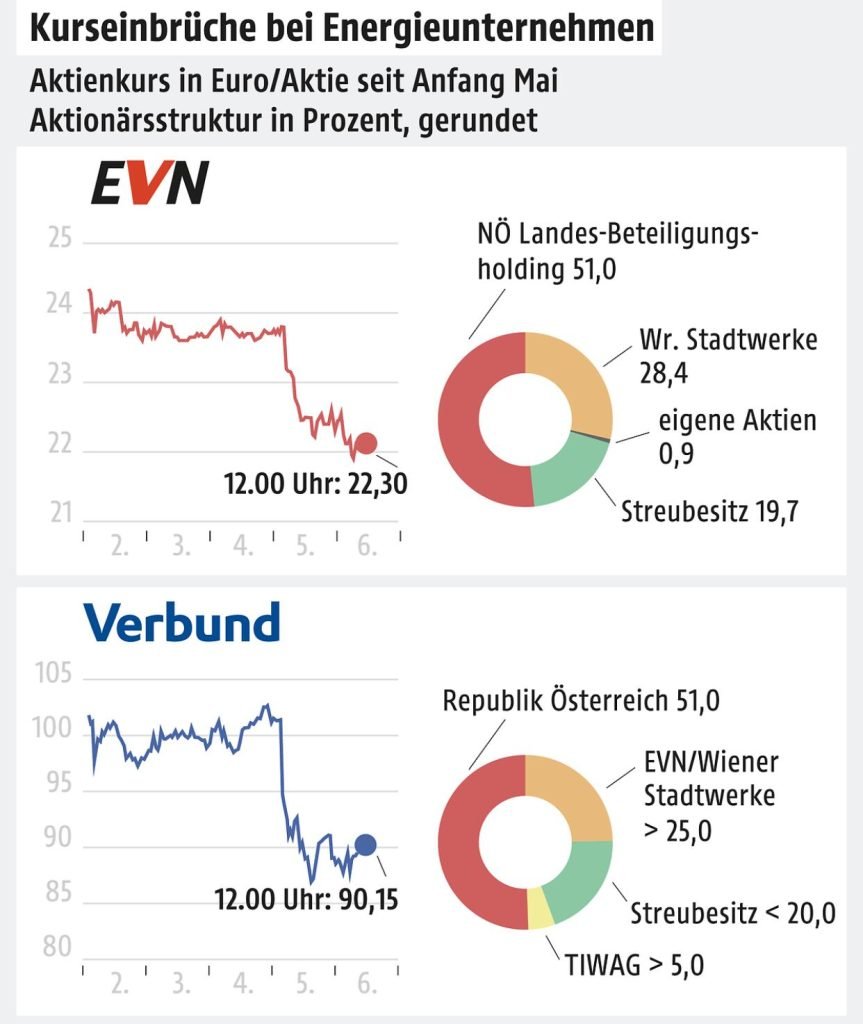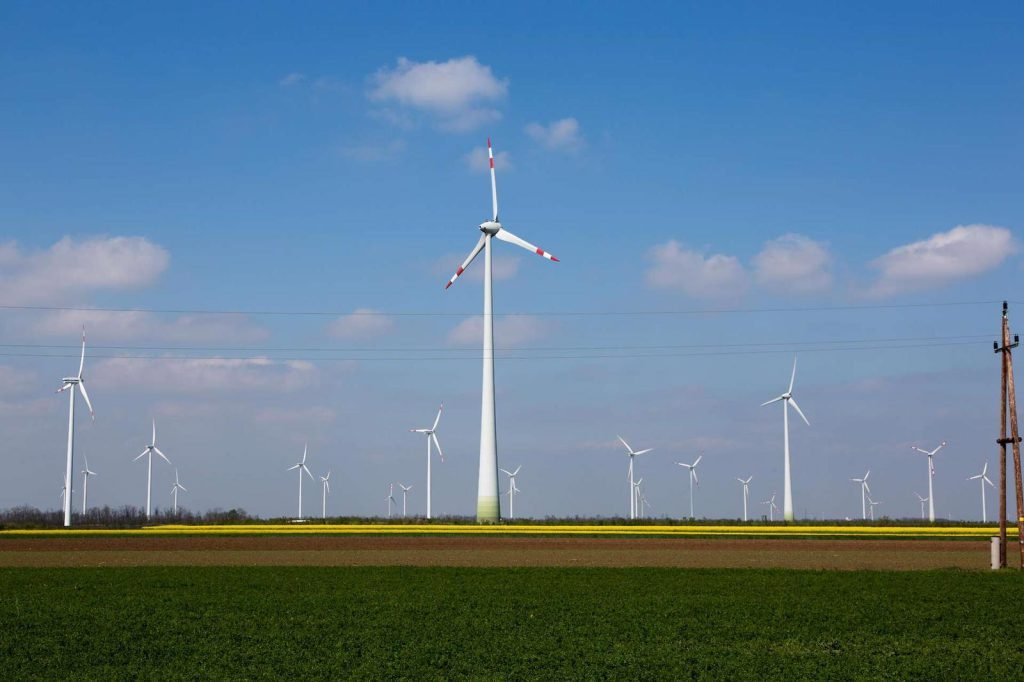By Karin Hiebaum
International Journalist
How should politicians deal with the fact that rising prices for – fossil – energy are giving some companies high profits? Chancellor Karl Nehammer (ÖVP) recently suggested skimming off the profits of companies in which the state holds a stake. The Ministry of Finance is examining exactly how this could work. The plans are just part of a larger debate about pricing in the energy market.
Words can have power – and sometimes they can be expensive. On Thursday, the domestic energy companies EVN and Verbund felt the effects of this. Their share prices dropped noticeably within one day. In total, the two companies, 80 percent of which are publicly owned, lost more than 5.4 billion euros in market value.

The share price slide was preceded by an interview with Nehammer in the «Tiroler Tageszeitung» («TT»). In it, the chancellor had spoken of considerations to legally skim off profits from companies with state holdings that profit disproportionately in crises. How and whether this could work should be examined by the Ministry of Finance and the Ministry of Economics, Nehammer said.
Energy producers: debate on profit skimming
Divided opposition
So far, these are only initial considerations. It may come as a surprise that they were put forward by an ÖVP chancellor. Until now, such proposals had been made mainly by the Social Democrats. Already on Thursday, the SPÖ interpreted Nehammer’s statements as an «admission of guilt by the ÖVP» with regard to the privatisations that had been pushed ahead in recent decades.
On Friday, SPÖ party leader Pamela Rendi-Wagner said she was pleased that the chancellor had now taken up the proposal – although the skimming of profits would have to be considered and reconsidered. Harsh criticism, however, came from FPÖ leader Herbert Kickl. The chancellor had damaged state property with his speech, Kickl said, referring to the share price collapses at Verbund and EVN. According to the FPÖ leader, the government would only need to use the distributed dividends to support the people.
DEBATE
Record inflation: What recipes does the government need?
NEOS was not sparing with criticism on Friday. Questioning the free-market order and polemically attacking Austrian companies is hair-raising, said NEOS economic spokesman Gerald Loacker. «If Nehammer persists in these positions, then he can consider marching on May 1 next year.» But he could very well envision reforming electricity pricing so that gas price increases don’t lead to expensive hydroelectric power, Loacker said.
Most expensive power plant determines price
Under the merit order principle used in electricity trading, the most expensive power plant needed to meet electricity demand always determines the price of electricity. In principle, this should lead to power plants with high generation costs being gradually squeezed out of the market.
The Timelkam gas-and-steam combined cycle power plant
At present, gas-fired power plants often determine the price of electricity
But – still – the power plant that determines the price is often a gas-fired power plant. When prices for natural gas skyrocket, as is currently the case, the price of electricity also rises. Companies like Verbund, which mainly operate inexpensive hydroelectric power plants, can – or actually must – then charge the same for the electricity they iproduce as the operators of the far more expensive Federal Chancellor Karl Nehammer
Decoupling of electricity and gas prices?
In a dispatch, the department confirmed that it had begun the review announced by Nehammer. In the written statement, the ministry also referred to «the current electricity-gas price coupling.» Because of it, «electricity companies are currently also benefiting from rising gas prices, the majority of whose electricity production comes from renewable energy. This development, which is unusual due to the war, is difficult to understand, especially in the case of energy companies in which the federal government holds shares,» the ministry said.
Wind turbines near Gattendorf
Electricity from renewable sources is currently significantly cheaper than electricity from natural gas
So is the government thinking about actively intervening to decouple electricity and gas prices? No, was the word from the ministry only a short time later. A spokesman for the Ministry of Finance told APA by telephone that it was not the intention to question this coupling.

Left-wing governments press ahead
In fact, it is mainly the social democratic-led governments in Portugal and Spain that are currently trying to detach electricity prices from the price of gas by means of state intervention. The «Spanish model» envisages the introduction of a gas price cap for power generation. Gas-fired power plants would then pay significantly less for the raw material than the remaining consumers. The difference to the market price would then be paid by the state for the power producers.
For Austria, the Chamber of Labor (AK) last but not least spoke out in favor of such a model. The government should make itself strong for it on European level, said AK energy expert Josef Thoman on Friday opposite the APA. Former Chancellor Christian Kern (SPÖ) had also advocated such state intervention in an interview with the «Standard» this week.
Greens «trust» finance minister
That the ÖVP-led Finance Ministry is thinking in such a direction seems rather difficult to imagine at the moment. Nor has the ÖVP’s coalition partner made any move in this direction so far. Energy Minister Leonore Gewessler (Greens) referred on Friday to aid packages already put together to cushion the high energy prices and said, «We are of course also looking at all measures and possibilities that are available in order to be able to provide targeted support here with further funds as well.»
Analysis by Hans Bürger (ZIB Domestic Policy).
Vice Chancellor Werner Kogler (Greens)also expressed himself in this direction: «What we have already addressed weeks ago in terms of fuel prices, also applies to electricity and gas: we should look very closely and counteract when corporations profit from fossil inflation as a result of the war of aggression in violation of international law. It is good that this is now the common goal with the coalition partner,» said Kogler. He said he had confidence in Finance Minister Magnus Brunner (ÖVP) that a workable implementation proposal would be put on the table here. «And with the goal of skimming off completely unjustified excess profits for the benefit of the general public and especially those who need it most anyway.»
Links:
ÖVP
SPÖ
FPÖ
Greens
NEOS
AK
Verbund
EVN





